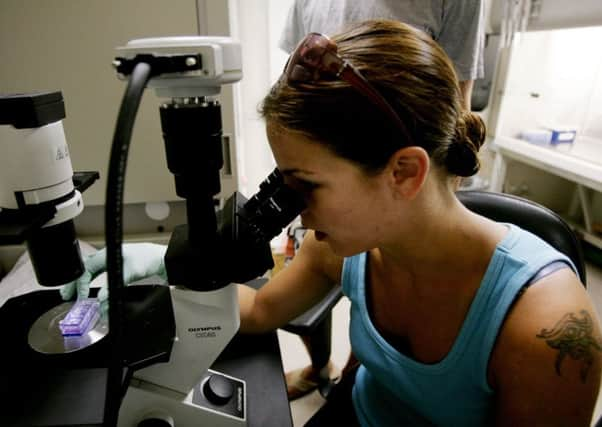Attitude to human embryology and abortion denies Scottish public a voice


With the Scotland Bill on devolution of further powers to the Scottish Parliament currently going through Westminster, one issue that will not be considered or discussed is the sensitive and controversial matter of human embryology and abortion.
This is despite the Smith Commission agreeing that: “The parties are strongly of the view to recommend the devolution of abortion and regard it as an anomalous health reservation.
Advertisement
Hide AdAdvertisement
Hide Ad“They agree that further serious consideration should be given to its devolution and a process should be established immediately to consider the matter further.” It also added that: “The devolution of … embryology, surrogacy and genetics… should be the subject of further discussions between the UK and Scottish governments.”
But since the 2015 general election, these promises have been quietly put aside notwithstanding both the Edinburgh and London governments stating, publicly, that they remain totally committed to deliver Smith’s recommendations in full.
The Scottish Government was even reported to have said: “There have been no substantive discussions and there aren’t any discussions scheduled.”
An unnamed SNP spokesperson has also confirmed that the devolution of these issues is not a priority and that they have now been dropped from the Scotland Bill.
There seems to be some very serious confusion, therefore, with the rhetoric on both sides of the Border. It should also be emphasised that any decision about devolving human embryology and abortion should not just be the preserve of the political elite and senior civil servants since they raise very serious interest amongst the general public. Indeed, there is still a need for a debate in Scottish society examining both the advantages and risks of devolving human embryology and abortion.
One of the advantages, for example, of devolving these issues would be that Scotland would be able to distance itself from the disreputable isolation of the Westminster parliament with respect to embryological legislation.
Of course, authorities in London repeatedly tell the general public that the UK has one of the best regulatory systems in the world relating to human fertilisation and embryology. But when one actually goes abroad to discuss the situation in Britain the reality is very different. Certainly, there are a few commentators in other countries who are jealous of the extremely permissive research setting that exists in the UK. What the general public does not realise, however, is that the majority of foreign bioethical experts express very grave concerns about the situation in Britain. It is one of the few states, in the whole of Europe, to actively resist implementing international law on ethical practice in human embryology such as the Council of Europe Convention on Human Rights and Biomedicine. This has already been ratified by 29 European countries with another six having signed their intention to ratify.
The UK is resisting such ethical legislation because it has already opened wide its liberal doors to enable possible practices such as the creation of human cloned embryos for destructive research and the insemination of animals with human sperm. These are procedures which are viewed with a lot of alarm and even abhorrence by other European states such as France, Switzerland, Turkey and Norway where biomedical researchers would be arrested by the police if they undertook similar experiments.
Advertisement
Hide AdAdvertisement
Hide AdMany in Scotland are unaware that its international responsibility and reputation, as a country supporting ethical practices, are at present being undermined by the Westminster parliament. Many would find it disturbing to know that other European countries are actually looking down with aversion at the situation in Scotland just because it is bound to the disreputable decisions taking place in London.
The possible devolution of human embryology and abortion to the Scottish Parliament could, therefore, be used to address this problem.
However, there may also be disadvantages in devolving human embryology and abortion. For example, according to the newspapers, the real reasons for putting aside these issues in the Scotland Bill arose from a concern for pregnant women wanting an abortion and the possibility of different legal limits on termination existing on either side of the Border.
Ethical discourse is all about balancing the advantages and risks of any proposal. In the end, it is very important that it is the members of the Scottish general public who consider these very sensitive and controversial matters in a serious manner. But sadly this has not yet happened.
• Dr Calum MacKellar is director of research of the Scottish Council on Human Bioethics www.schb.org.uk